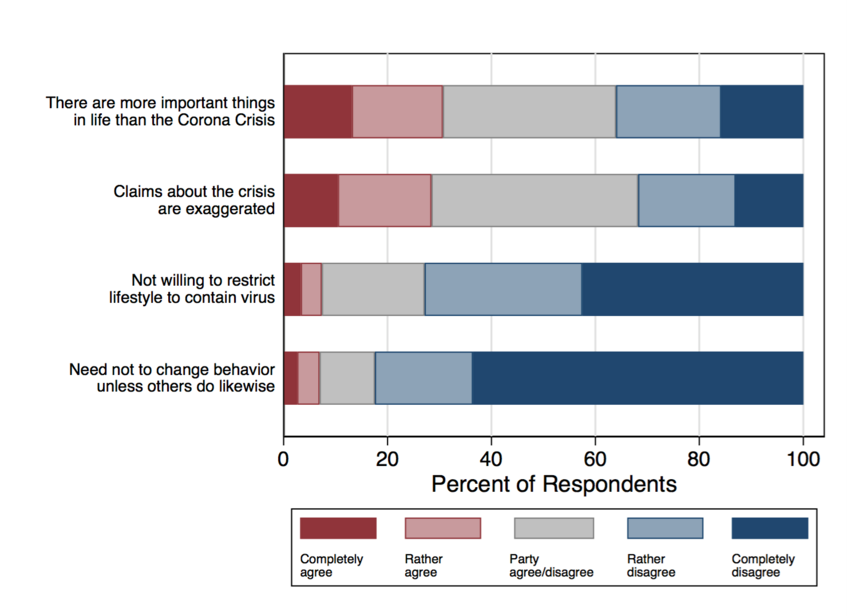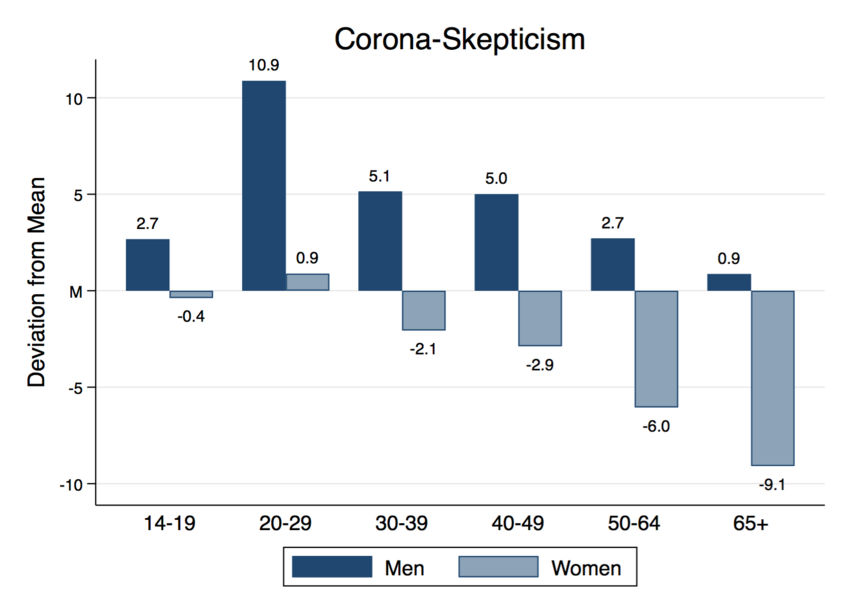15.04.2020
Most people take the situation seriously. But who are the Coronavirus skeptics?
- The vast majority of Austrian citizens take the Corona crisis seriously.
- Even among those who do not believe that the situation is very serious, some are nevertheless willing to adapt their behavior.
- On average, men - and especially those between the ages of 20 and 29 - are more skeptical than women.
- The least Coronavirus skepticism (among both men and women) is found in members of the risk group 65+.
By Jakob-Moritz Eberl, Noelle Lebernegg, Julia Partheymüller and Sylvia Kritzinger
Most experts agree: The lives of Austrians will only be able to return to some form of normality when everyone participates in the containment of the virus. However, in every crisis, there are people who do not take the situation seriously. The skepticism of some people can also lead to conflicts within the population - for example, when physical distancing regulations are not being followed. Although a certain amount of skepticism can be a sign of critical spirit and therefore need not be viewed negatively per se, too much carelessness can accelerate the spread of the virus.
For this reason, we have looked into the question of Coronavirus skepticism in times of crisis and tried to identify particularly critical groups. We have looked at whether there are differences between the various risk groups. In addition to higher age, which is considered a typical risk factor for severe courses of disease, men also seem to carry a higher risk than women: the mortality rate of male patients is significantly higher than that of women despite similar infection rates. In this blog, we, therefore, examine the question of whether and how people of different ages and genders differ in their assessment of the severity of the crisis.
Few are skeptical, but some are more skeptical than others
We define Coronavirus specific skepticism as a lack of awareness of the seriousness of the situation, as well as the refusal to adapt to new behaviors to contain the spread of the virus. To this end, we asked respondents how much they agreed with four statements. The more the respondents agree with these statements (i.e., "completely agree" or "rather agree"), the more skeptical they are about the Coronavirus crisis and its effects.
The data shows that only a minority of the Austrian population has coronavirus-skeptical tendencies (see Figure 1). 29% think that there are more important things in life than the corona crisis, and 28% think that many claims about the crisis are exaggerated. With this second statement, the proportion of undecideds (i.e., those who chose the "partly agree/disagree" response category) is also conspicuously large at one third. A clearer pattern can be seen in the willingness to restrict their own behavior: only 6% are not prepared to restrict their lifestyle to contain the virus or believe they do not need to change their behavior unless others do likewise.

Figure 1: Agreement with Coronavirus skeptical statements (Notes: Field time: 27-30 March 2020, N=1,541 persons interviewed (14 years and older), data is weighted and representative for the Austrian resident population).
In a second step, we combined the answers to these different statements into an index, where 0 stands for "not skeptical at all" and 100 for "very skeptical." On this index, our respondents are on average on 33 - i.e., rather less skeptical. In Figure 2, we now see the deviation of individual population groups (especially by gender and age) from this average value. In general, we show that Coronavirus skepticism decreases with increasing age, with women of all ages generally showing less Coronavirus skepticism than men. In other words, although men are more at risk, they show more Coronavirus skepticism, while women are more aware of the seriousness of the situation. Male respondents aged between 20 and 29 are particularly striking. They are about 11 index points more skeptical than the average respondent and a total of 20 index points more skeptical than women over 65.

Figure 2: Corona-Skepticism-Index by gender and age group (Notes: Field time: 27-30 March 2020, N=1,541 respondents (14 years and older), data is weighted and representative for the Austrian resident population. The index is based on the answers in Figure 1 (0 = not skeptical at all, 100 = very skeptical). Shown is the deviation from the mean value of this index over all respondents).
Is more persuasion necessary?
In sum, we have shown that overall, only a few Austrians do not see the situation as particularly serious. Even among these, many are nevertheless willing to accept the necessary changes in behavior. In short, the vast majority of citizens in Austria take the Coronavirus Crisis very seriously.
Nevertheless, fine differences can be identified. For example, men tend to be more skeptical than women. Men between the ages of 20 and 29 are particularly skeptical. If this skepticism leads them not to adhere to obligatory measures, not only could this pose a health hazard for those affected, but it could also become a challenge for society as a whole.
(Political) crisis communication should, therefore, be specifically adapted to certain subgroups. At the same time, further developments must be closely monitored (see a study from Germany). Finally, both an increase as well as an easing of the measures could lead to a swift change in the mood of the population, possibly more quickly in some groups than in others.
Jakob-Moritz Eberl has been a post-doc at the Department of Communication at the University of Vienna since April 2017 and a member of the Austrian National Election Study (AUTNES, Media Side) since 2013. He is also an associate researcher at the Vienna Center for Electoral Research (VieCER) and deals with questions on media effects, media trust and voting behaviour.
Noelle Lebernegg is a University Assistant (Prae-Doc) at the Department of Communication at the University of Vienna and an associate researcher at the Vienna Center For Electoral Research (VieCER). She focuses on the impact of political communication and media on public opinion and voting behaviour.
Julia Partheymüller works as Senior Scientist at the Vienna Center for Electoral Research (VieCER) at the University of Vienna and is a member of the project team of the Austrian National Election Study (AUTNES). She received her doctorate in social sciences at the University of Mannheim and studied political science at the Free University of Berlin and the University of Hamburg.
Sylvia Kritzinger is Professor of Methods in the Social Sciences at the Department of Government at the University of Vienna. She is deputy director of the Vienna Center for Electoral Research (VieCER) and one of the project leaders of the Austrian National Election Study (AUTNES). Her research focuses on political behavior, electoral research, democratic representation, political participation and quantitative methods.
Related Blog Posts
- Blog 4 (EN) - Old and New Media: Media Use in Times of the Corona Crisis
- Blog 15 (EN) - Of Misunderstood Snoopers and Other Anti-Coronavirus-Activists
- Blog 21 (EN) – Old And New Media: Disinformation in Times of the Corona Crisis
- Blog 40 (EN) - Audience Expectations of Coronavirus Reporting: From Watchdog to Lapdog?
